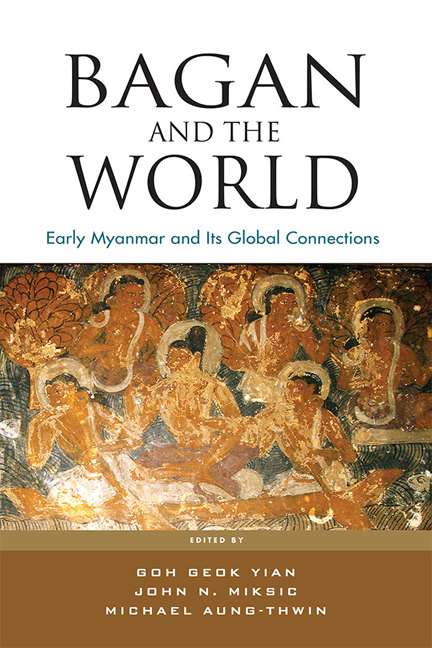Book contents
- Frontmatter
- Contents
- Preface
- Contributors
- 1 Keynote: The Myth of “Splendid Isolation”
- 2 Analysis of Construction Technologies in Pyu Cities and Bagan
- 3 Khraung-kaik Pitaka-taik: 16th-Century Repositories for Buddhist Scriptures in Mrauk-U
- 4 Religious Symbols as Decorations on the Sikhara of Ancient Monuments in the Late Bagan Period
- 5 The Viṣṇu on Garuḍa from the Nat Hlaung Kyaung Temple, Bagan
- 6 A Thousand Years before Bagan: Radiocarbon Dates and Myanmar's Ancient Pyu Cities
- 7 Ta Mok Shwe-Gu-Gyi Temple Kyaukse and Bagan
- 8 Silver Links! Bagan–Bengal and Shadowy Metal Corridors: 9th to 13th Centuries
- 9 Positioning Bagan in the Buddhist Ecumene: Myanmar's Trans-Polity Connections
- 10 Orthogeneity, Settlement Patterns and Earthenware Pottery Distribution in Bagan
- Index
- Miscellaneous Endmatter
8 - Silver Links! Bagan–Bengal and Shadowy Metal Corridors: 9th to 13th Centuries
Published online by Cambridge University Press: 01 February 2018
- Frontmatter
- Contents
- Preface
- Contributors
- 1 Keynote: The Myth of “Splendid Isolation”
- 2 Analysis of Construction Technologies in Pyu Cities and Bagan
- 3 Khraung-kaik Pitaka-taik: 16th-Century Repositories for Buddhist Scriptures in Mrauk-U
- 4 Religious Symbols as Decorations on the Sikhara of Ancient Monuments in the Late Bagan Period
- 5 The Viṣṇu on Garuḍa from the Nat Hlaung Kyaung Temple, Bagan
- 6 A Thousand Years before Bagan: Radiocarbon Dates and Myanmar's Ancient Pyu Cities
- 7 Ta Mok Shwe-Gu-Gyi Temple Kyaukse and Bagan
- 8 Silver Links! Bagan–Bengal and Shadowy Metal Corridors: 9th to 13th Centuries
- 9 Positioning Bagan in the Buddhist Ecumene: Myanmar's Trans-Polity Connections
- 10 Orthogeneity, Settlement Patterns and Earthenware Pottery Distribution in Bagan
- Index
- Miscellaneous Endmatter
Summary
This chapter isolates Bagan from its traditional moorings to Southeast Asian polities and highlights its westward links, particularly its relations with medieval Bengal, an expansive polity. The distinct geography and enigmatic history of Bagan — situated in an arid zone and driven by perennial cycles of conquest, expanding frontiers and growing exchange relations with small polities located between it and Bengal — illustrates how polities in the region responded to crisis and change. The region stretching from India's northeast into Burma experienced different trajectories of state formation, political legitimation and monetization; its nature can neither be studied within conventional paradigms of the state, nor by the “little kingdom” model (Schnepel and Berkemer 2003), the triad of time, change and linear evolution being irrelevant (Aung-Thwin 1991). Nor can its growth be analysed within a world-systems framework of cores and peripheries. Therefore, a different notion of political economy linked to time and change, distinct from the conventional notion of a sequential progression — from the prehistoric, through classical-ancient, to medieval, to the modern (Aung-Thwin 2002) — is necessary for our understanding of this region.
Enigma of Bagan
In its four-hundred–years-plus history (849 to ca. 1287 ce), Bagan displayed a state-driven religious policy, a state-directed labour system, a statesponsored building programme and state-administered trading practices. There was a direct and circular relationship between spending on religion, increased agricultural production, proportional demographic expansion and state development (Aung-Thwin 1985, p. 27). In this distinctive political and social formation, how important was trade and what was the role of money in Bagan's economy? What connections were forged by Bagan, with its silver supplies, with neighbouring polities? What follows is a visualization of Bagan's international connections, through tracing exchanges between Bagan and Bengal, to explain the curious absence of silver circulation in Bengal at a time when Bagan was reportedly accessing silver deposits. Was this silver traded at all? Why was it not exported as done previously? And what prevented the silver from reaching Bengal?
A Brief History of Money
A new polity in the mid-9th century, Bagan faced challenges on land while struggling to create a space for itself (Lieberman 2009, pp. 16–17). It seems isolated, cut off from silver supplies to its north and from the bay trade to its south.
- Type
- Chapter
- Information
- Bagan and the WorldEarly Myanmar and Its Global Connections, pp. 153 - 178Publisher: ISEAS–Yusof Ishak InstitutePrint publication year: 2017

